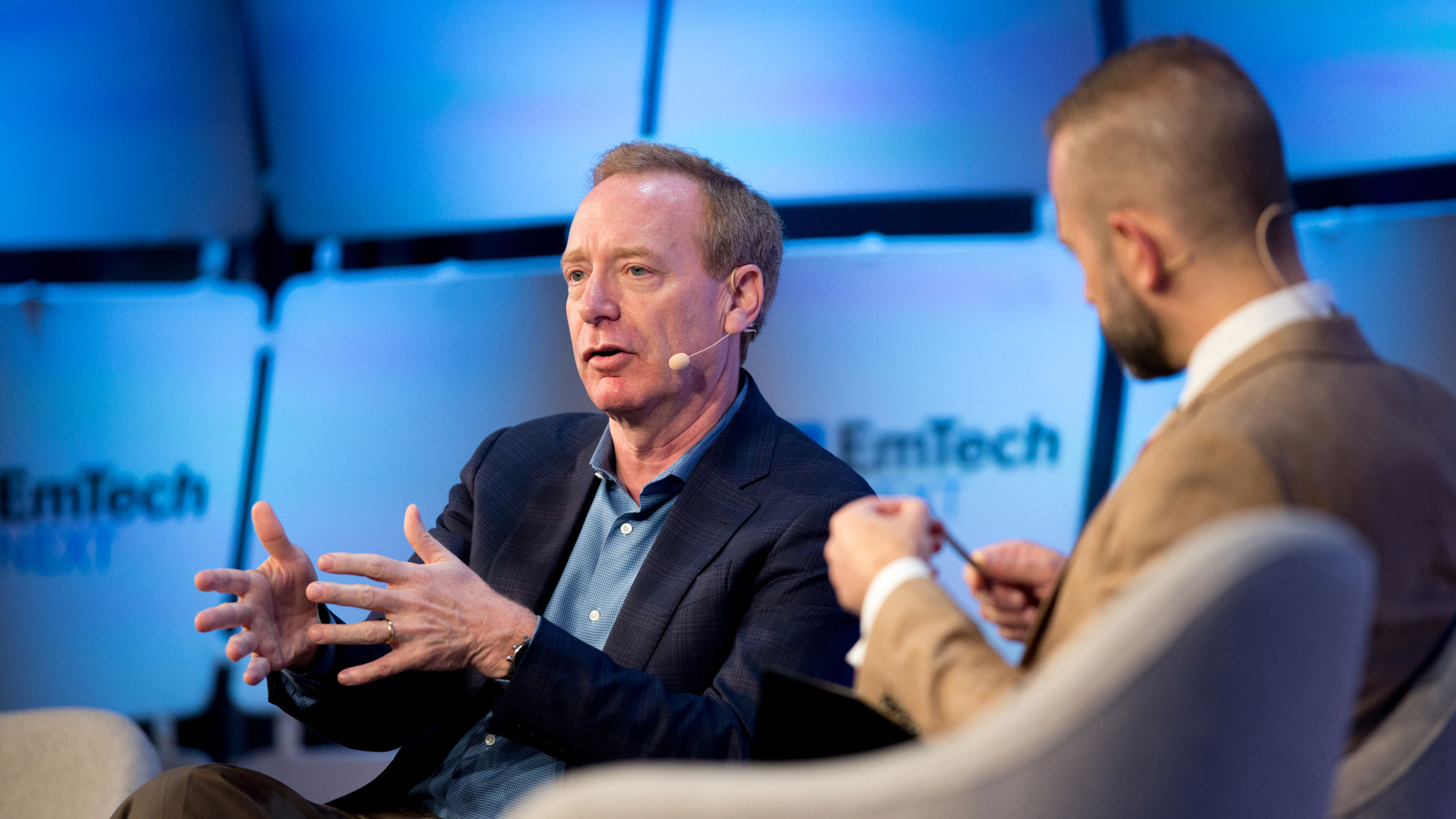Microsoft’s president says governments and Big Tech can get along

Tech businesses and governments are going to need to redefine their relationships if we’re to ensure that as many people as possible benefit from the way technology is changing jobs, according to Brad Smith, Microsoft’s president and chief legal officer.
Smith, who spoke on stage today at MIT Technology Review’s EmTech Next conference in Cambridge, Massachusetts, said it’s incumbent on technology companies to prepare their employees for changes brought about by the work they create.
He also made a few predictions. Among them, he suggested that the job of taking people’s drive-through orders at fast-food joints will disappear in three to five years. Voice recognition, he said, was getting to the point where machines will soon be able to reliably understand a cheeseburger order and enter it into the system.
Microsoft of course plays a role in developing such capabilities, and Smith said the company is careful not to turn a blind eye to their ramifications. “We’re engaged in a variety of efforts to think through from a policy perspective: What does this mean for the workforce?” he said.
Even so, companies like Facebook, Google, Amazon—and, yes, Microsoft—hold such sway over our personal and professional lives that calls have risen for governments to regulate or even break them up by suing them for antitrust violations. Smith, who was at Microsoft in the 1990s during its antitrust trial, indicated that some government regulation is useful to the wider economy. “Antitrust has played an important role in the economy since the 1890s,” he said.
But he also said the landscape is different now. Antitrust laws are in many ways outdated, he suggested, and overly focused on the prices consumers pay for a product. That worked fine a couple of decades ago, when Microsoft was in the habit of bundling Internet Explorer into its Windows software at the expense of other internet browsers. But the way people consume and work with information has become far more complex. “Is data the new currency?” he posited. “Is privacy the new price?”
Smith also addressed the need for governments to create the right infrastructure to allow innovation. “The government made sure every American had electricity,” Smith said in an interview after the session, adding that at least 25 million people in the US, mostly in rural areas, lack broadband access. That digital divide, Smith said, has escaped the government’s notice even as net neutrality has become a political football. “Net neutrality is not the key to getting more broadband into rural places,” he said, and he bemoaned how difficult it is currently to tell where there is reliable and accurate information about internet availability. “Public investment requires much better data,” he said. “It’s very frustrating to grapple with data maps that are not only incomplete but downright inaccurate.”
Smith emphasized that responsibility for any area in which technology influences society should be shared among business, government, and civil society. “Government has a clear role to play, in my view,” he said. “Real solutions for the future will come from bringing businesses and government together.”
As for Smith’s predictions about jobs? They may come true faster than even he expects. As he stepped out from the backstage area, an entrepreneur from Denver approached Smith to introduce himself. His company? A startup focusing on replacing drive-through workers with voice recognition software.
Keep Reading
Most Popular
Large language models can do jaw-dropping things. But nobody knows exactly why.
And that's a problem. Figuring it out is one of the biggest scientific puzzles of our time and a crucial step towards controlling more powerful future models.
How scientists traced a mysterious covid case back to six toilets
When wastewater surveillance turns into a hunt for a single infected individual, the ethics get tricky.
The problem with plug-in hybrids? Their drivers.
Plug-in hybrids are often sold as a transition to EVs, but new data from Europe shows we’re still underestimating the emissions they produce.
Stay connected
Get the latest updates from
MIT Technology Review
Discover special offers, top stories, upcoming events, and more.